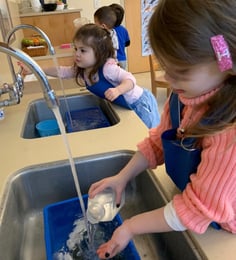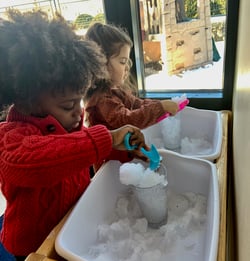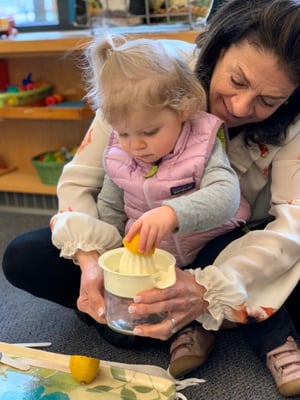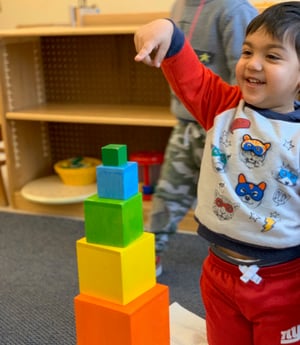
A Child's Intellectual Tapestry
In Stepping Stones, we witness this “tapestry weaving” every day, whether it be through sink play in the classroom, singing songs and clapping in music class or building castles in the sandbox outside on the playground. Each experience that our children have is building important connections in the brain that create pathways for learning.
Research on brain development tells us that our readiness to learn anything quickly and efficiently seems to depend on the formation of synapses in the brain as well as myelin, a fatty substance that develops from birth until adulthood. When a brain system is myelinated, messages travel more quickly. Myelination happens naturally, assisted by a heathy diet of essential fatty acids. Dr. Healy writes that myelination cannot be hurried, but it can be enriched by a wide range of physical and mental challenges.
“Explaining things to children won’t do the job; they must have a chance to experience wonder, experiment, and act it out for themselves,” Healy writes. “It is this process, throughout life, that enables the growth of intelligence.”
 For instance, after a snowstorm we fill the sensory bins with snow for the children to play with in the classroom. They are able to feel the coldness of the snow, the texture, whether it is soft and moldable or hard and unyielding. This tactile experience paves the way for understanding several concepts, such as, “snow,” “ice,” “cold,” “hard” and “soft.” Furthermore, as the snow melts in the warm classroom the children witness this physical change of matter. They understand these concepts better than if an adult merely explained the definitions of freezing and melting to them.
For instance, after a snowstorm we fill the sensory bins with snow for the children to play with in the classroom. They are able to feel the coldness of the snow, the texture, whether it is soft and moldable or hard and unyielding. This tactile experience paves the way for understanding several concepts, such as, “snow,” “ice,” “cold,” “hard” and “soft.” Furthermore, as the snow melts in the warm classroom the children witness this physical change of matter. They understand these concepts better than if an adult merely explained the definitions of freezing and melting to them.
Renowned French psychologist Jean Piaget regarded cognitive development as a process where the child creates his own intelligence by building upon bits of knowledge, or “schemas.” This intelligence-building occurs due to biological maturation as well as interaction with the environment. In her book Dr. Healy renames these schemas, “mental hooks,” where children hang new information on previous pieces of knowledge. A toddler who touches cold snow will understand the concept better than a child who has never experienced it firsthand.
Sensory Experience
Our children seek out sensory experiences and may be consistently drawn to a favorite activity, whether it be water play at the sink or molding sand in the playground. As parents, we worry that by repeating the same activity over and over our children are not challenging themselves, but as educators we understand this is not the case. Dr. Maria Montessori described this behavior as being in a “sensitive period,” when a child is keenly attuned to a particular type of stimuli or activity. She observed that a child would have an intense interest in a particular activity, repeating it over and over until they have satisfied that part of their brain. She believed this period is the optimal time for acquiring a specific ability, and once it is over it is more difficult to learn that particular skill.
Dr. Montessori wrote that from birth to age six, children go through different sensitive periods, many of them overlapping, as they develop. Among the sensitive periods are a fascination with small objects, order, movement, reading, writing, and sensory. The sensitive period for sensory stimulation begins at birth.
To that end, the Montessori classroom is rich with sensory experiences. One of the cornerstones of our curriculum in Stepping Stones is Food Tasting, where the class samples a different type of food each week, usually a fruit or vegetable. During food tasting we gather together on the carpet and learn about the food. We discuss its appearance, its color, does it feel rough or smooth, does it have a skin, is the skin edible, does it have seeds or a pit, do we eat it raw or do we need to cook it. When the children take a bite they discover if it is soft, juicy or crunchy, sweet, sour or salty. This type of sensory impression not only helps to build prior knowledge about certain foods, but it also helps to develop and enrich a child’s vocabulary. To experience the taste of something sweet and juicy is the most effective way to understand the meaning of those descriptive words.
curriculum in Stepping Stones is Food Tasting, where the class samples a different type of food each week, usually a fruit or vegetable. During food tasting we gather together on the carpet and learn about the food. We discuss its appearance, its color, does it feel rough or smooth, does it have a skin, is the skin edible, does it have seeds or a pit, do we eat it raw or do we need to cook it. When the children take a bite they discover if it is soft, juicy or crunchy, sweet, sour or salty. This type of sensory impression not only helps to build prior knowledge about certain foods, but it also helps to develop and enrich a child’s vocabulary. To experience the taste of something sweet and juicy is the most effective way to understand the meaning of those descriptive words.
Sometimes we prepare the food with the children, incorporating mathematical and scientific concepts along with language. For example, cutting a potato into smaller pieces is a way to demonstrate parts of a whole, a concept that is important for future understanding of addition and subtraction as well as fractions. Cooking the pieces of potatoes to make them soft and then mashing them with a potato masher changes the potato’s physical properties, and like the melting snow in our sensory bin, it becomes a scientific experience. More math and science come into play when we measure butter, salt and milk and mix it into our cooked potatoes to make mashed potatoes!
A child’s work with sensory activities puts together visual and motor learning to understand the concepts of size, density, texture and volume.
Sensory - Developing Executive Functioning & Self Regulation
“The senses, being explorers of the world, open the way to knowledge,” Dr. Montessori wrote in her book The Absorbent Mind. “Our apparatus for educating the senses offers the child a key to guide his explorations of the world, they cast a light upon it which makes visible to him more things in greater detail than he could see in the dark, or uneducated state.”
.jpg?width=250&name=shaving%20cream%203%20(1).jpg) Dr. Healy’s research in neuroscience supports Dr. Montessori’s method. Healy credits sensory activities such as scooping sand, rice, snow -- or even potatoes – as a means for young children to make mental patterns. A child’s work with sensory activities puts together visual and motor learning to understand the concepts of size, density, texture and volume. Dr. Montessori developed an entire curriculum around refining the senses, with an emphasis on movement. Measuring and pouring are ways to develop hand-eye coordination and motor control while making mathematical and scientific observations. What happens when the rice is poured from a larger container to a smaller one? What if it is poured onto the floor?
Dr. Healy’s research in neuroscience supports Dr. Montessori’s method. Healy credits sensory activities such as scooping sand, rice, snow -- or even potatoes – as a means for young children to make mental patterns. A child’s work with sensory activities puts together visual and motor learning to understand the concepts of size, density, texture and volume. Dr. Montessori developed an entire curriculum around refining the senses, with an emphasis on movement. Measuring and pouring are ways to develop hand-eye coordination and motor control while making mathematical and scientific observations. What happens when the rice is poured from a larger container to a smaller one? What if it is poured onto the floor?
Sensory activities also play an important part in developing executive functioning and self-regulation skills, the mental processes that enable us to plan, focus attention, remember instructions, and juggle multiple tasks successfully. This happens when a child predicts, plans and experiments as he plays. Block play is a good example of this type of sensory activity. A younger child will stack blocks to make a tall tower and knock it down, doing this over and over and squealing with delight each time. He is  experimenting not only with math concepts – building a three-dimensional structure using geometric shapes – but scientific concepts as he causes the structure to topple.
experimenting not only with math concepts – building a three-dimensional structure using geometric shapes – but scientific concepts as he causes the structure to topple.
An older toddler might decide she wants to use the blocks to build a house for her doll. She may have a plan in her mind before she builds. She uses spatial reasoning to position the blocks in a rectangular shape to make the walls, and discovers which blocks can best support the base of the walls as she builds them up. Her plan may evolve as she experiments with different sizes and shapes of blocks. Sometimes she executes symmetry or creates patterns in her structure, using smaller blocks in intervals along the top of the walls to resemble towers on a castle. All the while she is executing her thinking by using prior knowledge and building upon that prior knowledge.
“Learning that arises from personal experience helps brains at any age receive, associate, organize, and comprehend at the appropriate neural levels,” Dr. Healy writes. “Far from marking time, well-planned programs at each level develop the hooks of meaning that underlie intelligence.”
FurtherReading:
Jane M. Healy, Ph.D. is an educational psychologist and the author of Your Child's Growing Mind: Brain Development and Learning From Birth to Adolescence. Maria Montessori was an Italian physician and educator best known for the philosophy of education that bears her name. Among her many writings about early childhood development is her book, The Absorbent Mind.
Jean Piaget is a renowned psychologist whose theories of cognitive development had a profound influence on child psychology. Among his writings is the book, The Psychology of the Child.

